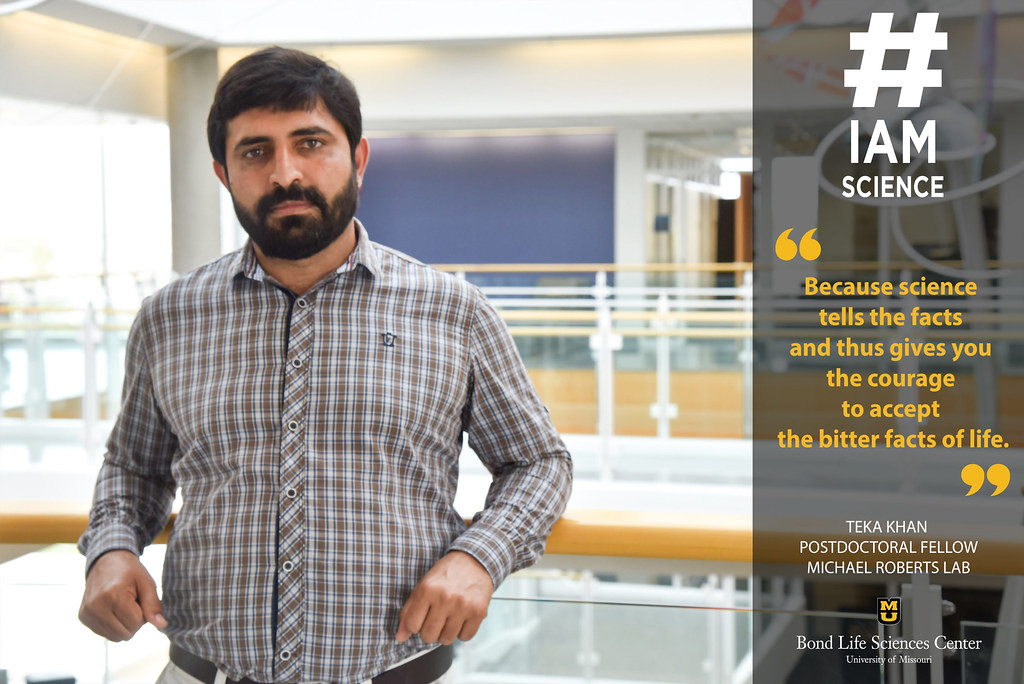Published on
By Becca Wolf | Bond LSC
Growing up in the countryside of Pakistan, Teka Khan did not have a science class in high school. In fact, his first science class was in college and it was in English — a language he did not know at the time.
“First I had to understand the word meaning. So, what I did for physics, chemistry, and biology is I bought a dictionary,” Khan said. “I had to translate each and every word, and then I had to understand them, so I wrote down the meaning of each word. Sometimes I look back and think, ‘how did I do that?’”
Now a postdoctoral fellow in the Michael Roberts’ lab, Khan knows his stuff, and wants to give back to his community in Pakistan.
To do so, he helps with the Youth Educational & Welfare Organization in Mattani, Peshawar, Pakistan (YEWOM).
YEWOM promotes educational and welfare activities in hopes of improving the community and making students productive people in society.
“We usually have different types of activities,” Khan said. “We visit different schools to observe if there are any deficiencies in quality of learning, if there’s water or if there aren’t any toilets for the kids. Depending on the cost, we try to fix it. If the cost is beyond our limit, we try to find a funding agency or consult NGOs in the government organization.”
Khan was president of YEWOM for two years and still helps out even though he now lives over 7,000 miles away.
“From here, I usually give them suggestions,” Khan said. “So right now I’m contributing by sharing my own experiences, because I’m one of the senior most in the organization. We always promote the young people so they can learn how to lead the community. We provide them the platform to grow.”
Khan has always had a passion for helping others. To him, it is the best way to become a good person.
“It is necessary for each and every human being to do some work to live,” Khan said. “I’m a researcher, somebody will be a teacher, somebody will be a businessman, and so on. The ultimate goal is to get the resources for life, which we are doing for ourselves. But it doesn’t matter how much I’m a good scientist or how rich a businessman is, what matters is if we are good human beings, to me, that is most important. Everyone should be firstly a good human being then you can do other things.”
Toshi Ezashi, research professor in the Roberts lab, has witnessed this positive attitude firsthand.
“He spent a long time to come here but he never gave up and eventually came here in March [2020],” Ezashi said. “He tried to invite his family here around June, but then the pandemic happened. I think it was hard to him because he couldn’t see them for such an extended time. I don’t think they were able to join him until last November, but he didn’t complain. He just put all of his time and energy into the science and research. Even after his family joined him, he’s still passionate about his work.”
In the lab, Khan is working on developing trophoblasts in the early stages of the human placenta using embryonic stem cells.
“Sometimes experiments don’t work, but he doesn’t get upset,” Ezashi said. “He might be feeling bad, but he doesn’t project that onto others and never gets discouraged by failure. He just keeps pressing forward and tries to improve.”
This tenacity has paid off for Khan. He has developed protocol for isolating nuclei from trophoblast cells and is publishing that work soon.
Now that Khan has settled down here at Bond LSC, he plans on continuing to help others and promote educational opportunities.
“I like to say that as a biologist we can understand the nature of almost all animals,” Khan said. “We can understand if you are just doing things for yourself because every animal is doing things for themselves. As a social animal, humans give back to others. You have to try to give back to other people and help out.”
